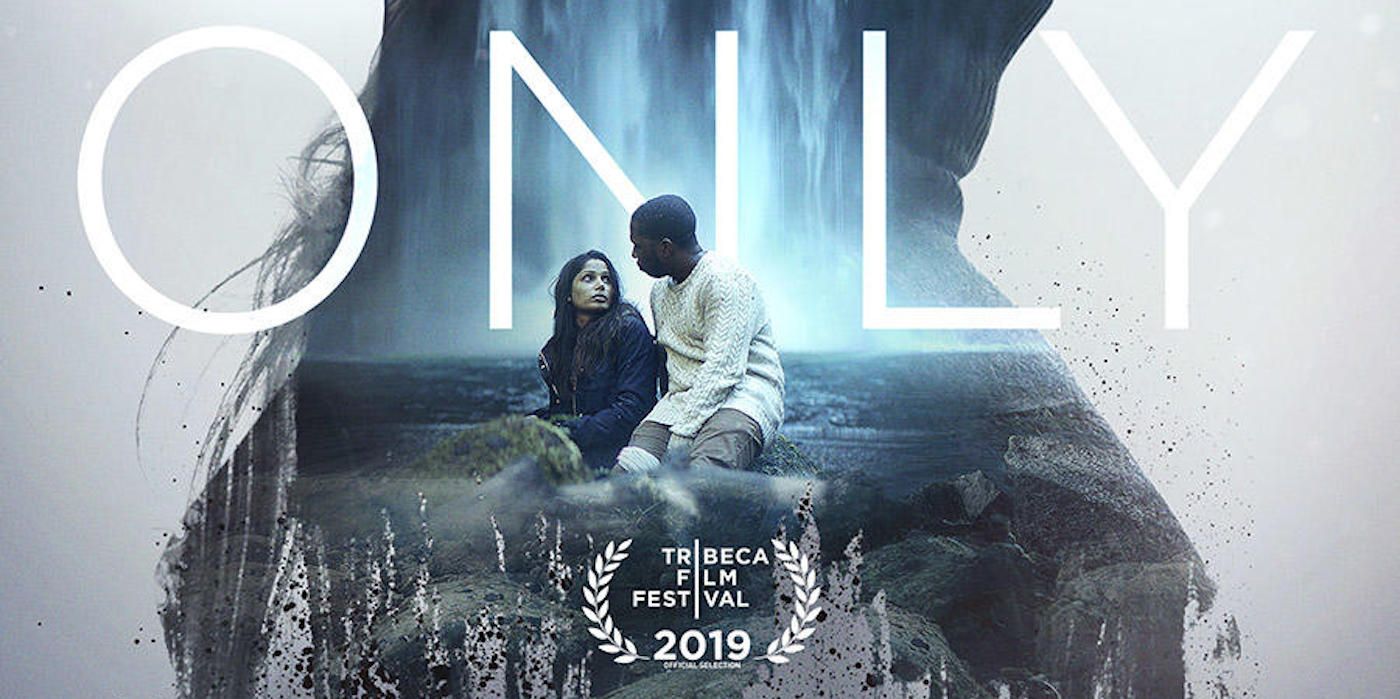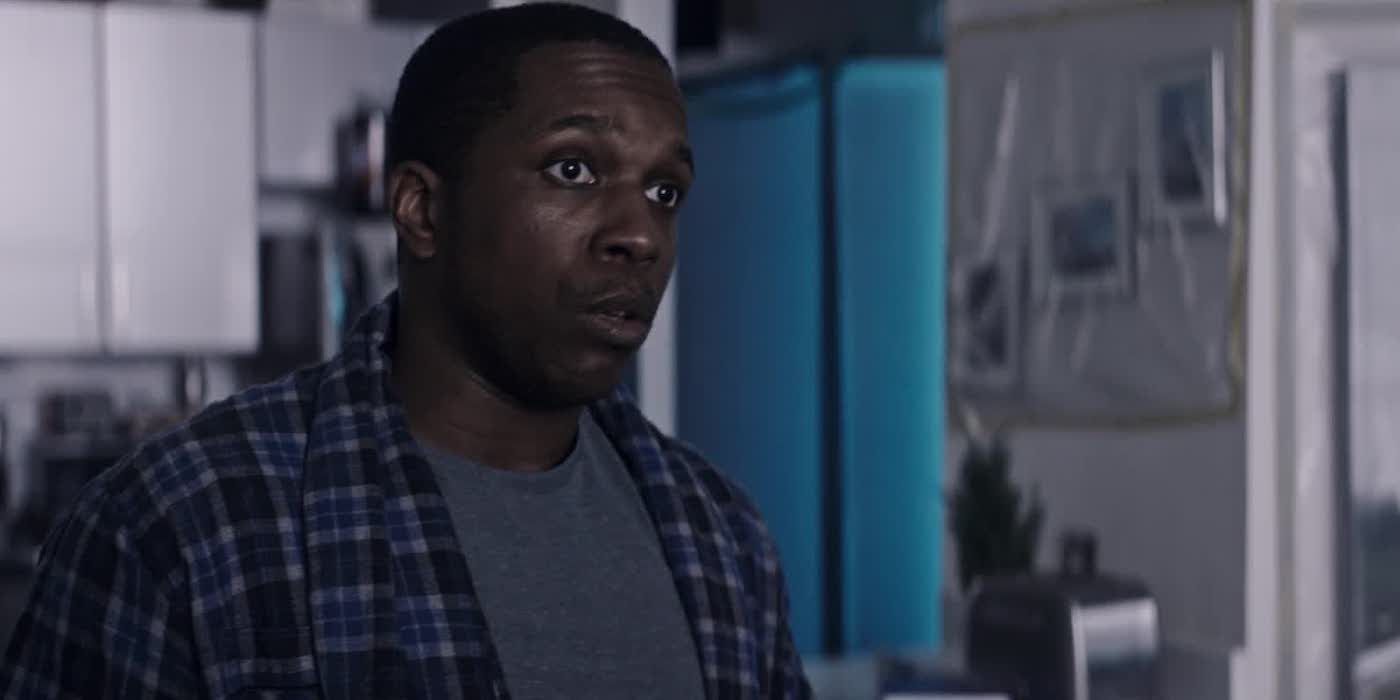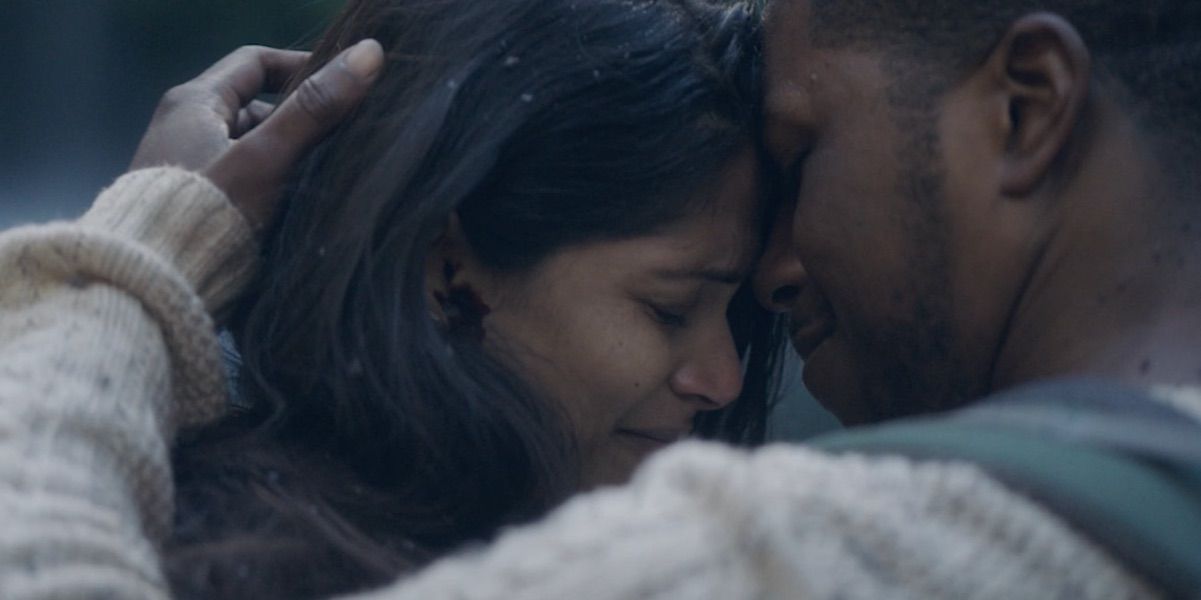WARNING: The following article includes spoilers for the movie Only.
This past weekend Leslie Odom Jr., who won a Tony Award for originating the role of Aaron Burr in Hamilton on Broadway, kicked off a 16-city North American tour in support of his 2019 album Mr. Clearly, Odom Jr. is nothing if not prolific. In addition to singing and appearing on Broadway, he’s steadily amassed a long resume of film and television roles. And in addition to his tour, this weekend marked another milestone: the release of his film Only in theaters and on demand.
The movie is a post-apocalyptic thriller in which a comet unleashes a virus on Earth that only kills women. The action centers on a couple, Odom Jr.’s Will and Freida Pinto’s Eva, who quarantine themselves in their apartment in an attempt to keep Eva alive and safe from the disease as well as those hunting any remaining living women.
Odom Jr. took a few minutes out of his incredibly busy schedule to speak to CBR about Only, the challenges of creating a long-term relationship onscreen and the movie's difficult gender politics.
Also, check out an exclusive clip from the film at the end of the article.
CBR: What attracted you to this movie and this role?
Odom Jr.: The chance to work with Takashi Doscher, who I thought was an exciting young filmmaker. And he was really passionate about this story, about making a genre movie that had a really strong, relatable relationship at the center of it. And so pretty much that, the chance to really drop into this thing and put myself in a tough place emotionally with Freida. You know, actors are weird that way. The harder emotionally, the better.
Post-apocalyptic stories are one of the more popular genres at this point in time. Was there something about this particular one that made it stand out to you?
You’re right about that. Post-apocalyptic shows are a really popular, big genre right now, kind of because we're all ruminating on it all the time, in the back of all of our minds all the time. But I really liked that [Only] was a big story being told but on a smaller scope, …It focuses really on this couple, on these two people, because that's the next thought for all of us too. It’s like, is the world in trouble, and if the world is in trouble …we all have this immediate responsibility to the people that are closest to us whether it's friends, kids, partners. For Will and Eva… they’re all they have, all they have is each other, so they're their primary focus and the thing that becomes top of their list is…, I think for Will: how can I protect [Eva and] keep her safe?
How did you and Freida work together to create Will and Eva's dynamic? It seemed very intimate.
We had a fair amount of rehearsal with Takashi where we talked a lot about their relationship…. I remember really clearly the time before I proposed to my now-partner, my wife, and really the line that you cross within yourself, I think, as a person when it gets serious, when someone becomes more than just a person you’re dating, when it becomes somebody you want to spend your life with. And so, we just really talked about, with Takashi, what it means.
[Will and Eva have] been in this long-term relationship for a few years and they've been dating in grad school and then work brought them apart and so... [the movie] starts with we're moving in together, and what she doesn’t know is that [Will’s] weeks away from proposing, a month away from proposing…. And so I just remember the nightmares that I started having, as a guy who’s about to take that step, I started to have these nightmares about something happening to [his wife] Nicolette. And something really happens to you when you decide to open yourself up in that way, you give your heart to somebody and you decide to be vulnerable in that way.
So really it’s a heavy thing without the apocalypse. It’s heavy no matter what, so… the more we kind of made it a really wonderful time for Will and Eva, the harder their circumstances were going to be on them. Takashi and Freida and I really tried to build up as much love and a healthy relationship for them out of the backdrop of this really challenging time, or impossible time….
The movie has all of these themes about gender dynamics and who controls women's bodies and it's very thought provoking for the way it brings those issues up. Can you speak a little to your thought process in terms of tackling those issues in the movie?
Takashi and I talked a lot about Will and his masculinity and… you know, how we can fall into these roles [and] what [Will] thought his responsibility was to his partner based on what a man is supposed to do, even sometimes without asking…. And then the conversation, I tried to have it in real time, …it’s a really hard conversation about what is your responsibility?... The answer to that question becomes more complicated once you get into a committed relationship. You have to think about more than just yourself, and does somebody have to ask for your consent to save your life. It's a tricky, tricky situation that they're both in. I certainly don't think Takashi wrote [Will as] a typical male chauvinist. I don't think that he's doing that. I have a lot of compassion for Will obviously and a lot of love for Eva and her position. It was tough….
Actually that was one of the things I was thinking about a lot during the film. It's hard because you go back and forth between sympathizing with Will and then being annoyed with him. He wants to keep Eva safe, that's completely understandable, but then it is uncomfortable when you realize that does require a certain level of control over her. How did you approach walking that fine line?
I tried to think about… what people turn to in times of crisis and how people try to gain control over their own personal little ecosystem when the larger ecosystem is falling apart. And Will leans on what he knows, and… he goes a little overboard, [but] he's trying to regain control over his little world and that means… crossing lines with Eva as well. But he's trying to make it all make sense. He’s leaning into what he knows best, which is engineering and building things.
At one point, Eva asks Will if he loves her. And his answer isn't an emphatic “yes.” As a performer, what was your thought process getting into that moment?
It was a pressure cooker, it was a little hotbox. And so I fully invested in my guy. And I've had these discussions with my wife about the languages of love, and that people show it in different ways, people need to receive it in different ways. And, again, those things are true even when it's not a time of crisis, and so in crisis and stress it's really tough to remember those kinds of things.
And so Will’s kind of looking like, "How can you not see I'm showing you that I love you. Everyday all I do is think about keeping you safe and protecting you. How could you not see that?" What she's talking about is, "Yeah, well, that's actually not what I need. What I need is this other thing.” And so it's small relationship stuff writ large. It’s like the small problems become big problems. And so if this virus hadn't happened these are the fights they would have been having over small thing… [they’re] having the small fights just in a big way.
That’s one of the fascinating things about the movie. Eva gets into a position where she has to force Will to come to terms with what she wants. What was it like portraying that?
I think we push as hard as we possibly can until we fail or we succeed. I think that that’s what Will’s doing and I think he has to come to peace with [Eva asserting herself]... later but he certainly can't do it in that moment. I think he's had a singular focus for so long, for so many days, and… all is lost in that moment. I think it would take some time to try to get on the other side of that is [and ask] is it all lost and is it better to have loved at all.
It was just trying my best to make all that stuff real for me, …to bring Will as close to myself as possible and for me to walk as close to this guy who’s lived a slightly different experience than I. [And] trying to get up as close as possible so that the the reaction could be honest.
You’ve had an incredibly eclectic career. This role in Only is 180 degrees different from something like Aaron Burr in Hamilton and a lot of the other things you've done. What attracts you to different projects?
Probably the first thing is the collaborators, the script. Only was probably the second movie that I did after Hamilton. It's taken a while for it to come out. We shot it a while ago. So, yeah, the collaborators, the script. I want to learn the maximum amount and I want to keep doing things that I've never done before. [Only] was essentially a two-person movie, it was essentially a two-hander, and I never had that kind of challenge before. So I'm glad that I took it on. I don’t know if I’d do it again but I’m glad I took it on.
Only, directed by Takashi Doscher, stars Freida Pinto, Leslie Odom Jr. and Chandler Riggs. It is now playing in select theaters and available on demand.



